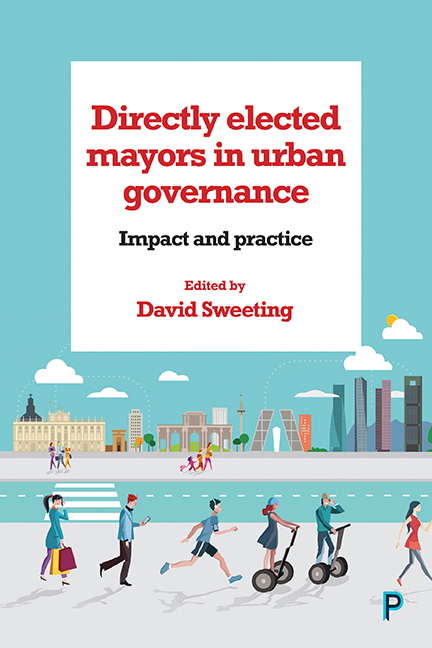one - Introduction: directly elected mayors in urban governance
Published online by Cambridge University Press: 05 April 2022
Summary
This book is about directly elected mayors – political leaders who head multi-functional municipal authorities and are voted into power directly by citizens in those municipalities. In many countries, such as the US, Canada and Japan, directly elected mayors are a typical or traditional feature of local political systems. In many others, they have been taken up as a reform to a system of local, urban or metropolitan government, and have been introduced more recently in many countries including Italy, Germany, Poland, Hungary and England (Hambleton and Sweeting, 2014). Supporters of the model of electing city leaders directly by popular vote tend to argue that it has both democratic process and functional efficiency advantages. Directly elected mayors are portrayed as being more visible, more accountable, more legitimate and more powerful than other sorts of city leader. As a result, it is asserted that directly elected mayors are therefore better equipped with greater capacity to govern than other sorts of political actor.
Marsh (2012) noted that directly elected mayors have enduring and widespread appeal to policymakers, and this book taps in to that interest. For example, In the UK, directly elected mayors are not only seen as a way of improving urban governance (Sims, 2011), they are also a key part of the city-regional agenda (Harrison, 2015), and the government has passed the Cities and Local Government Devolution Act 2016 to pave the way for ‘metro-mayors’, with responsibilities across city regions across England. In Australasia, a debate continues about the ways that directly elected mayors can play a stronger role in governance there (Sansom, 2012). A fairly typical policy-related rationale comes from the Plain English Guide to the Localism Act, from the UK Government (DCLG, 2011). As part of a programme designed to encourage the creation of directly elected mayors in cities in England outside London, the government argued:
Many major cities in the world outside of the UK have a strong and powerful executive mayor. The Government believes that elected mayors can provide democratically accountable strong leadership which is able to instigate real change for the benefit of our largest cities. Mayors will be clearly identifiable as the leader of the city and will have a unique mandate to govern as they will be directly elected by all local electors. People will know who is responsible for a decision and where the buck stops.
- Type
- Chapter
- Information
- Directly Elected Mayors in Urban GovernanceImpact and Practice, pp. 1 - 16Publisher: Bristol University PressPrint publication year: 2017



